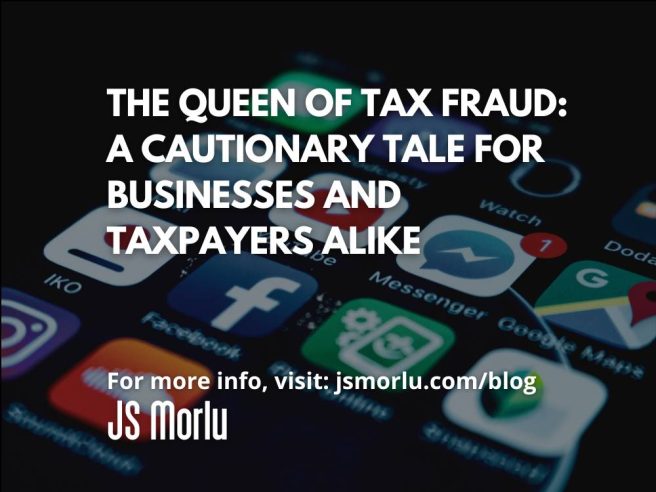Imagine calling yourself the “Queen of IRS Tax Fraud”… on Facebook. Out loud. For everyone—including the IRS—to see.
That’s exactly what Rashia Wilson did in the early 2010s. What followed was a fast rise, a dramatic fall, and a federal case study that still haunts tax professionals, small businesses, and regulators across the country.
Let’s break down the story of Rashia Wilson—not just as a sensational headline, but as a teachable moment for business owners and high-net-worth individuals navigating the complex world of tax compliance.
The Reign of Rashia: When Tax Fraud Looked Like a Lifestyle
Between 2009 and 2012, Rashia Wilson and her partner, Maurice Larry, ran what prosecutors called a “factory of fake returns” out of Tampa, Florida. Armed with thousands of stolen identities, they submitted fraudulent tax returns worth millions in unearned refunds.
How much did the Treasury pay out? Over $3 million. Had the operation gone unchecked, the losses could’ve ballooned to $11 million.
The couple funneled their tax theft into a lifestyle of extravagant excess: designer clothes, wads of cash, and a birthday party for her daughter that cost a jaw-dropping $30,000. Oh—and a $90,000 Audi. Paid in cash.
Despite having no legitimate income, Rashia lived like a socialite. And she made sure everyone knew it.
Social Media: The Smoking Gun
While most fraudsters lay low, Rashia Wilson was flaunting her wealth on Facebook like it was her personal reality show.
In one now-infamous post, she wrote:
“I’m Rashia, the queen of IRS tax fraud. I’m a millionaire for the record. So if you think indicting me will be easy, think again!”
She even taunted law enforcement, claiming she wouldn’t go to jail because she was “too pretty” and “talked too much.” Spoiler alert: she went to jail. For a long time.
Her Facebook feed became an unexpected goldmine for investigators. While agents built their case through surveillance, wiretaps, and financial records, Rashia’s social media antics served up the indictment on a silver platter.
The Fall: From Facebook Fame to Federal Prison
In 2013, Rashia Wilson pleaded guilty to wire fraud, aggravated identity theft, and firearm possession. The judge—James Moody Jr.—sentenced her to 21 years in federal prison, one of the harshest penalties ever handed down for tax fraud.
Judge Moody didn’t sugarcoat it. He stated:
“She knew what she was doing was wrong. She reveled in the crime and even invited the IRS to catch her.”
Wilson’s legal team appealed, citing procedural errors and arguing that the sentence was excessive when compared to similar white-collar cases. But in 2015, the judge upheld the sentence. Her public persona, repeated fraud, and use of firearms weighed heavily in the decision.
Lessons for Business Owners and Taxpayers
At JS Morlu, we’ve seen firsthand how tax fraud isn’t always committed by hackers in a dark basement—it’s sometimes done by someone living in plain sight.
So what can entrepreneurs, government contractors, and high-net-worth individuals learn from this?
1. Oversharing Can Be Overwhelmingly Risky
Transparency is important—but so is discretion. Boasting about finances or tax strategies on social media can turn into unintended evidence. If you’re in a complex tax situation, speak with a CPA. Not your followers.
2. Identity Theft Is a Business Threat
Rashia’s fraud exploited IRS vulnerabilities tied to identity theft. If you’re a business handling client or employee data, this story underscores why robust cybersecurity and compliance measures matter. Not just morally—but legally.
At JS Morlu, we help implement security protocols and IRS compliance frameworks that reduce your exposure to fraud—yours or others’.
3. Tax Fraud Leaves Real-World Wreckage
The victims in this case weren’t just the IRS—they were real people whose identities were stolen. In the wake of this scandal, the IRS overhauled its refund verification process, including:
- IP PINs for taxpayers
- Delayed refunds for returns claiming refundable credits
- Tighter regulations on preparers and tax software
These reforms, in part, came because of high-profile cases like Wilson’s.
What Happens Next?
Rashia Wilson is currently serving her sentence in a federal facility and is expected to be released in January 2031.
By then, the Facebook post that made her infamous will be nearly 20 years old—a digital artifact that continues to warn against the dangers of arrogance, fraud, and financial ignorance.
Final Thought: Don’t Be a Rashia—Be Proactive
If you’re a small business owner, executive, or high-net-worth individual, take this story as a wake-up call. It’s not just about avoiding fraud. It’s about building trust, staying compliant, and managing your wealth the right way.
At JS Morlu, we help you do just that. From forensic audits to identity theft response planning, tax optimization, and compliance reviews, we offer strategic financial services that protect and grow your wealth—without the risk of orange jumpsuits.
📞 Schedule your consultation today and let’s build your legacy the right way
JS Morlu LLC is a top-tier accounting firm based in Woodbridge, Virginia, with a team of highly experienced and qualified CPAs and business advisors. We are dedicated to providing comprehensive accounting, tax, and business advisory services to clients throughout the Washington, D.C. Metro Area and the surrounding regions. With over a decade of experience, we have cultivated a deep understanding of our clients’ needs and aspirations. We recognize that our clients seek more than just value-added accounting services; they seek a trusted partner who can guide them towards achieving their business goals and personal financial well-being.
Talk to us || What our clients says about us

